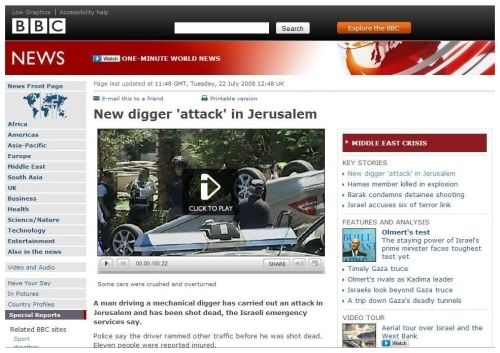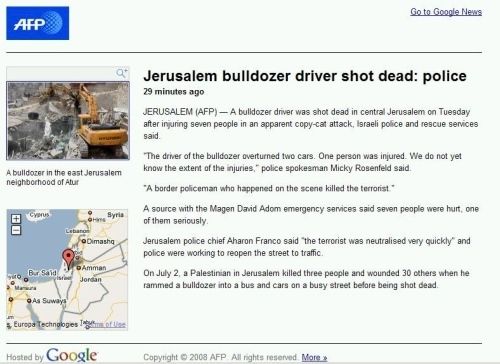Less than three weeks after a Palestinian from east Jerusalem used a bulldozer to kill three people on a busy street in Israel’s capital, another east Jerusalem resident attempted to replicate the attack. The second attacker rammed his bulldozer into a bus, then began flipping cars on the street, wounding at least 16 people.
When the first bulldozer rampage took place, we were stunned to see the BBCs initial headline focusing on the fate of the driver who was shot by Israeli security rather than the victims of his attack. The BBC subsequently changed its headline to make it more neutral, reflecting what appeared to be a better understanding of the incident and its significance.
Or so we thought. Despite a virtual repetition of the first incident, the BBCs initial response the second time was a headline questioning whether an attack had taken place at all. The headlines on the BBCs web page went from New Vehicle Attack in Jerusalem to New Digger Attack in Jerusalem, then finally settled on Israel Hit By New Digger Attack.

It is difficult to understand how the BBC ever saw the incident as anything other than an attack. The bulldozer driver rammed into a bus, then pushed into it several more times, shattering glass and throwing the passengers into a panic. He then zigzagged through the road to harm as many motorists as possible before he was stopped. This is how the bus driver described the incident to the Jerusalem Post.
“I was driving on the main road when suddenly the tractor hit me in the rear on the right hand side,” said bus driver Avi Levy.
At first Levy thought it was a traffic accident, but then the attacker struck the bus over and over, causing pandemonium as passengers shouted: “God save us” and “escape, escape.”
“He made a U-turn and rammed the windows twice with the shovel. The third time he aimed for my head – he came up to my window and death was staring me in the eyes,” Levy said.
“Fortunately I was able to swerve to the right [onto a small side street], otherwise I would have gone to meet my maker,” he said as he stood next to the badly damaged bus, whose left-side windows were completely blown out.
In the news story beneath the headline, the BBC does not put quotes around the word “attack.” However, the headline writers make the first impression with readers and undermine what otherwise could be fair coverage of the incident. But the BBC was not the only media outlet that skewed the story with its initial headline. Agence France-Presse (AFP), the third largest wire service after the AP and Reuters, repeated the BBCs shocking error from the first attack, placing all of the emphasis on the driver instead of his victims.

Although the AFP changed its headline to Palestinian Shot Dead After New Bulldozer Rampage, its first story on the incident was headlined, Jerusalem Bulldozer Driver Shot Dead: Police. The headline leaves out any information about victims or a rampage, leaving the casual reader scanning headlines to believe that a construction worker had been killed without cause.
There is no excuse for such a misleading headline, even as an initial report. The first paragraph of that first story already acknowledges police sources saying that the driver was killed after injuring several people, so it is impossible to argue that the headline writers didnt have the facts available.
You can send your comments to the BBC Complaints website – http://www.bbc.co.uk/complaints (for detailed instructions on how to navigate the BBC Complaints website, click here). For the AFP, write to [email protected].
LOOKING BEYOND WIKIPEDIA
The Jerusalem Posts technology writer David Shamah offers hope for people who have begun to despair of Israel getting fair treatment on Wikipedia, the online encyclopedia that anyone can edit. Although he notes that the Israel page on the site is still dominated by Arab propagandists, he also points to other sites that are part of the Wikipedia family that do not appear to be biased against Israel.
One such site is WikiNews, a news site that allows people to contribute their own content in the same way Wikipedia allows people to edit articles.
Reuters and AP could learn a lesson or two from this site on how to write an objective article that deals in fact, not opinion. In the May 23 incident in which Israeli planes confronted an unidentified aircraft that turned out to be Tony Blair’s plane, Reuters wrote “Israeli fighter jets scrambled to intercept a plane carrying Middle East peace envoy Tony Blair this week after his pilots failed to identify themselves,” the emphasis being on intercepting the plane carrying the ‘peace envoy.’ I could spend a whole article just analyzing that sentence, in fact!
Compare that to the WikiNews version: “Israel scrambled two fighter jets to intercept a suspicious aircraft that was failing to respond to air traffic control (ATC) and had moved into attack positions, only to discover that it was carrying International Middle East peace envoy and former Prime Minister of the United Kingdom Tony Blair.” A lot more factual – and accurate description of what actually happened.
The objectivity found on WikiNews demonstrates that citizen journalists could produce work that upholds journalistic standards better than some professional reporters. We’ll continue to keep an eye on the site to make sure the quality remains.

